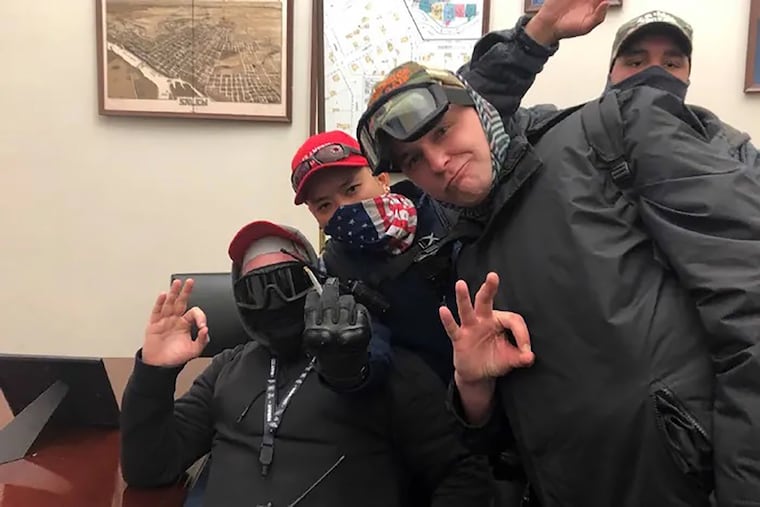Proud Boys’ Zachary Rehl is guilty. Here’s why he probably thought he’d get away with it.
Rehl and the Philly Proud Boys have threatened me for years. But they always found cops who showed them they were above the law.

On Thursday, four members of the Proud Boys — including Zachary Rehl, the president of the Philadelphia chapter — were convicted of sedition for the role they played in the attack on the U.S. Capitol on Jan. 6, 2021.
The first thought I had when I heard the news was: It’s the end of an era.
The monthslong trial served as a daily painful reminder of the role Rehl has played in my life.
The first time the Proud Boys came to my home to threaten me, I was out of state, traveling to attend a family function. It was June 2019, and they arrived at nearly midnight.
My downstairs neighbor was home, out on our building’s porch for a smoke break. The far-right gang members approached him, demanding to know if I was there.
He didn’t know, he told them. They demanded that he tell me to stop writing about their racist activities and posting members’ names on Twitter. Then they plastered a sticker with their logo onto my front door. They placed more around the neighborhood for good measure.
When we got home, I called the cops. These guys had been threatening me for months, furious. Now they’d shown up to frighten me in person, vandalizing my home. Surely that was actionable?
The Philadelphia police officer who took my report didn’t seem impressed. They were probably trying to scare me, he said.
Well, yes. But in a functioning democracy, shouldn’t violent intimidation of political opposition be considered … worrisome, at least?
He didn’t seem to think so.
Neither did his union, apparently. In July 2020, members of the Philly Proud Boys partied at the private bar belonging to the Philadelphia Fraternal Order of Police, a tacit endorsement of the same far-right brownshirts who had vandalized my home almost exactly a year prior.
The same brownshirts who called a rally at the park across the street from me in September 2020, threatened to kidnap me off my porch that day, and taunted me by name as they patrolled in front of my building with what appeared to be a firearm visible.
The same brownshirts who, months later, would forge “official” Megan’s Law posters with my home address, falsely alleging I was a convicted pedophile.
As the aftermath of Jan. 6 unfolded and Philly Proud Boys president Rehl was accused of acting as one of the lead generals of the insurrection, I’ve found myself reflecting more and more deeply on how it was that Rehl — by all accounts one of the more careful, deliberate, and strategic members of his national far-right gang — ended up so emboldened. How did the guy who made his fascist career staging ostentatious shows of “back the blue” end up charging police barricades and facing trial for violent sedition?
Then again, I’m not totally surprised. Because time and time again, there were members of the Philadelphia police force who showed the Proud Boys — and Rehl, specifically — that they were willing to apply the law unequally, and in favor of the white far-right gangs, just as long as those gangs gave appropriate lip service to their police protectors.
Rehl didn’t make it into the highest national leadership echelons of the Proud Boys because he was a streetfighter — quite the opposite. Rehl’s elevation happened because he developed a reputation for caution and strategy, for his history of relatively intelligent organizing, and his consistent ability to evade legal consequences for his actions.
It is that history of chummy and enabling behavior by some members of our police force locally and nationally that convinced Rehl he would walk away from that occupation of the Capitol building a free man.
Rehl comes from a cop family. His grandfather was a cop.
Even after his very public journey into far-right extremism, there were cops who protected and enabled him. A retired cop bar owner even allowed Rehl to use his establishment to recruit.
There were cops who protected and enabled him.
Other cops invited him and his violent, illegal gang into their own private drinking club to party, despite his ongoing campaign of escalating violence against me and others.
Again and again, Rehl found police officers who were ready to make him feel that he was not just above the law, but an honored ally and friend of law enforcement.
So, as the Jan. 6 Proud Boy sedition trial comes to a close, let’s not just talk about the Proud Boys themselves. Let’s talk about the behavior that made those Proud Boys think they could show up and try to overthrow the government with impunity.
Let’s talk about how there were cops who led them to believe that they could do whatever they wanted and skate free. There were cops who taught them they were above the law.
When Black Lives Matter protesters marched, police tear-gassed and scarred nonviolent protesters with rubber bullets. Proud Boys, though? They found police officers who would ignore their menacing behavior, time and time again.
» READ MORE: I’m a protester getting part of the $9 million settlement. It’s not enough. | Opinion
Rehl may be headed to jail, but the police officers who taught him to believe that he was above the law likely still patrol our streets with guns, likely facing no repercussions or critique for their role in the creation of this insurrectionist and this insurrection.
Prison for Rehl won’t fix the problem, because Rehl is just a symptom.
Gwen Snyder is a writer, researcher, and longtime Philadelphia organizer.